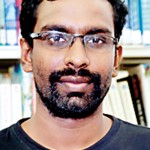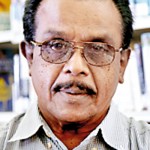Founded in 1993, the Gratiaen Prize was set up by Booker Prize-winner Michael Ondaatje to share the wealth received and inculcate and celebrate Sri Lankan writing in English. The Prize is awarded to the best work in English by a Sri Lankan writer residing in Sri Lanka. The announcement of the Gratiaen shortlist was hosted by the British Council. This year, the evening’s proceedings were preluded by the inauguration of the Gratiaen Prize Collection at the British Council library – library goers can now peruse 120 books by Gratiaen Prize winners and shortlisted writers.
The judging panel for 2014 comprised Sonali Deraniyagala (Chair), Dinali Fernando and Jehan Aloysius. Absent from the proceedings but expected to attend the main event, Sonali Deraniyagala teaches at SOAS, University of London and at SIPA, Columbia University, New York. She is the author of the internationally acclaimed memoir ‘Wave’.
Meet the shortlisted writers
Sandali Ash Sandali has a Bachelor’s degree in Mathematics andis currently reading for a Masters in Financial Economics. Her unpublished novella ‘Rao’s Guide to Lime Pickling’ was prompted by a suggestion by her thesis mentor to write a book instead of a research paper. She was 21 when she wrote the first draft of the novella two years ago.
‘Rao’s Guide to Lime Pickling’ is the compilation of memories of a young boy growing up in the North of Sri Lanka during the last two decades of the war. Although war, violence and politics create the framework for the narrative, it is a story of life and is fiction set against real events. “My favourite author is Gabriel Garcia Marquez whose novel ‘One Hundred Years of Solitude’ changed the way I felt about storytelling, while Paulo Coelho’s ‘The Alchemist’ inspired me to write simply,” says Sandali. This is her first work.
Quintus G. Fernando
“My novel is written as a personal diary kept by a young priest in a fishing village where the people are the poorest of the poor. He has to deal with the harsh reality of their lives. But by getting closer and closer to their lives, he is also compelled to face his own inner battles,” explains Quintus about his published novel and first submission to the prize, ‘Celibacy Factor’. Quintus holds a PhD from the University of London (his subject of specialty is “Minorities in Sri Lanka with special reference to the Donoughmore Commission”) and was the Rector of a leading school in Colombo. In the US at the invitation of University of Notre Dame in Indiana he returned to Sri Lanka recently.
Sandali has a Bachelor’s degree in Mathematics andis currently reading for a Masters in Financial Economics. Her unpublished novella ‘Rao’s Guide to Lime Pickling’ was prompted by a suggestion by her thesis mentor to write a book instead of a research paper. She was 21 when she wrote the first draft of the novella two years ago.
‘Rao’s Guide to Lime Pickling’ is the compilation of memories of a young boy growing up in the North of Sri Lanka during the last two decades of the war. Although war, violence and politics create the framework for the narrative, it is a story of life and is fiction set against real events. “My favourite author is Gabriel Garcia Marquez whose novel ‘One Hundred Years of Solitude’ changed the way I felt about storytelling, while Paulo Coelho’s ‘The Alchemist’ inspired me to write simply,” says Sandali. This is her first work.
Quintus G. Fernando
“My novel is written as a personal diary kept by a young priest in a fishing village where the people are the poorest of the poor. He has to deal with the harsh reality of their lives. But by getting closer and closer to their lives, he is also compelled to face his own inner battles,” explains Quintus about his published novel and first submission to the prize, ‘Celibacy Factor’. Quintus holds a PhD from the University of London (his subject of specialty is “Minorities in Sri Lanka with special reference to the Donoughmore Commission”) and was the Rector of a leading school in Colombo. In the US at the invitation of University of Notre Dame in Indiana he returned to Sri Lanka recently.
 Vihanga Perera
Vihanga Perera’s collection of poems ‘Love and Protest’ deals with the very themes it is named after – love and protest. The collection was compiled by Paw Print Publishing who undertook Vihanga’s poetry as a project. The collection contains poems written during October 2013 – November 2014. Vihanga started writing in his teens and has been shortlisted for the Gratiaen prize previously, in 2006 and 2008.
In an email interview with the Sunday Times, he confessed to having a soft spot for poetry but also writes across multiple genres. “I’m quite dexterous – I like working with all forms, often experimenting within and between genres.” Vihanga’s published work includes collections of poetry –People Who Don’t Count – (2012), Pesticides (2009); fiction–(The Fear of Gambling – (2011), Unplugged Quarter -(2009) Stable Horses – (2008)– as well as short fiction and essays and criticism.
Vihanga Perera
Vihanga Perera’s collection of poems ‘Love and Protest’ deals with the very themes it is named after – love and protest. The collection was compiled by Paw Print Publishing who undertook Vihanga’s poetry as a project. The collection contains poems written during October 2013 – November 2014. Vihanga started writing in his teens and has been shortlisted for the Gratiaen prize previously, in 2006 and 2008.
In an email interview with the Sunday Times, he confessed to having a soft spot for poetry but also writes across multiple genres. “I’m quite dexterous – I like working with all forms, often experimenting within and between genres.” Vihanga’s published work includes collections of poetry –People Who Don’t Count – (2012), Pesticides (2009); fiction–(The Fear of Gambling – (2011), Unplugged Quarter -(2009) Stable Horses – (2008)– as well as short fiction and essays and criticism. Ayathurai Santhan
Ayathurai Santhan’s ‘Rails Run Parallel’ is set in the backdrop of the 1977 riots and deals with human nature and relationships. The binaries of love and hatred, understanding and misunderstanding, selfishness and altruism, past and present run parallel in human life and is reflected in this novel, as well. He explains that the first draft had been fermenting for a long time and the 2014 call for entries for the prize proved to be the final push which propelled him to complete the novel. “Writers always start as good readers and it was true in my case as well. Reading made me write first in my mother tongue, Tamil, from my high school days. After two decades I started trying my hand in English as well,” explained Santhan. An Engineer by profession, Santhan is a lecturer at a leading private educational institutio
Ayathurai Santhan
Ayathurai Santhan’s ‘Rails Run Parallel’ is set in the backdrop of the 1977 riots and deals with human nature and relationships. The binaries of love and hatred, understanding and misunderstanding, selfishness and altruism, past and present run parallel in human life and is reflected in this novel, as well. He explains that the first draft had been fermenting for a long time and the 2014 call for entries for the prize proved to be the final push which propelled him to complete the novel. “Writers always start as good readers and it was true in my case as well. Reading made me write first in my mother tongue, Tamil, from my high school days. After two decades I started trying my hand in English as well,” explained Santhan. An Engineer by profession, Santhan is a lecturer at a leading private educational institutio
Leave Comments